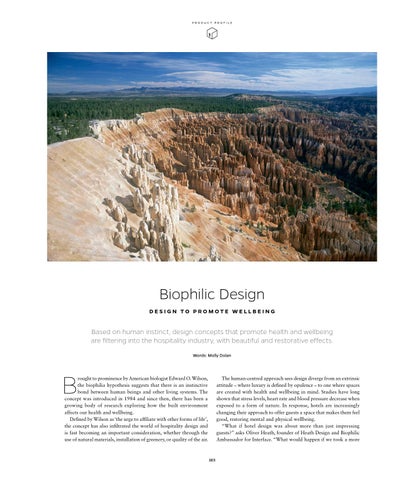Biophilic Design DESIGN TO PROMOTE WELLBEING
Based on human instinct, design concepts that promote health and wellbeing are filtering into the hospitality industry, with beautiful and restorative effects. Words: Molly Dolan
B
rought to prominence by American biologist Edward O. Wilson, the biophilia hypothesis suggests that there is an instinctive bond between human beings and other living systems. The concept was introduced in 1984 and since then, there has been a growing body of research exploring how the built environment affects our health and wellbeing. Defined by Wilson as ‘the urge to affiliate with other forms of life’, the concept has also infiltrated the world of hospitality design and is fast becoming an important consideration, whether through the use of natural materials, installation of greenery, or quality of the air.
The human-centred approach sees design diverge from an extrinsic attitude – where luxury is defined by opulence – to one where spaces are created with health and wellbeing in mind. Studies have long shown that stress levels, heart rate and blood pressure decrease when exposed to a form of nature. In response, hotels are increasingly changing their approach to offer guests a space that makes them feel good, restoring mental and physical wellbeing. “What if hotel design was about more than just impressing guests?” asks Oliver Heath, founder of Heath Design and Biophilic Ambassador for Interface. “What would happen if we took a more
163
